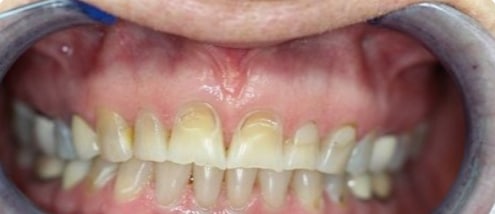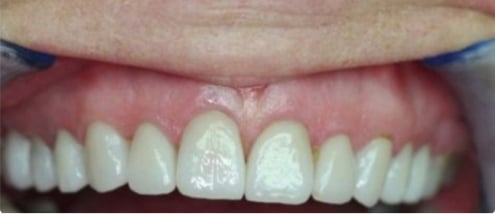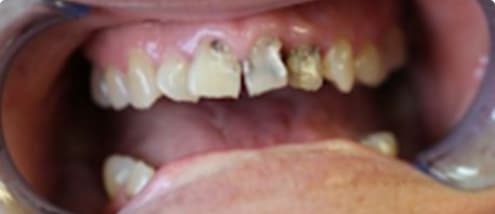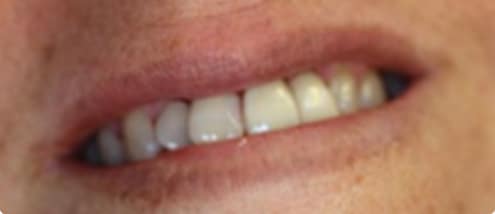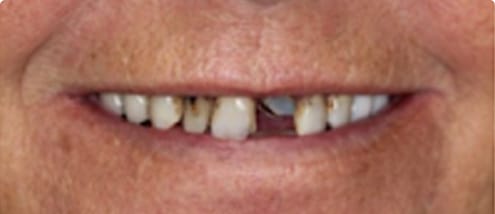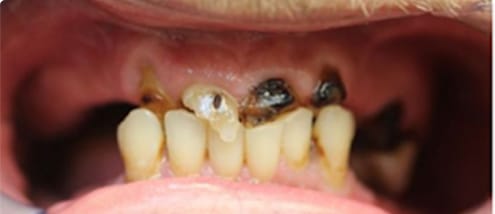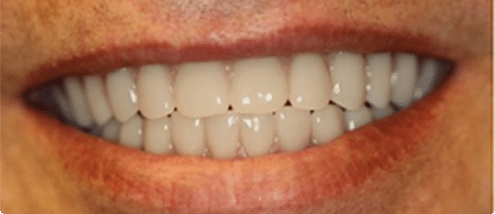Diabetes is a chronic condition that can affect nearly every part of the body, including the teeth and gums. That’s why dentists make diabetes management a major priority for diabetic patients. Although it is a serious condition, diabetes can be controlled and doesn’t need to be a threat to your oral health. If you have or are at risk of developing diabetes, you’ll want to pay close attention to your oral health. Here’s what you need to know about how diabetes affects your teeth and gums.
How Diabetes Increases Your Risk of Gum Disease and Tooth Decay
There are multiple kinds of diabetes, but all of them have a serious impact on your oral health. If your diabetes is poorly controlled, you’ll have difficulty healing from oral health conditions and may see salivary gland impairment – which can put you at an increased risk of gum disease and tooth decay. In diabetics, periodontal disease progresses the same way it does in non-diabetic patients, with the one exception that the disease progresses faster. Diabetics are also at an increased risk of mouth infections and dry mouth, which can contribute to cavity formation.
Dental Care for Diabetics: Keeping Your Teeth and Gums Healthy
If you have diabetes, you’ll need to take precautions keep your mouth healthy. Visiting your dentist twice per year for a cleaning and check-up will keep any oral health issues under control. You’ll also want to take your insulin as prescribed and eat meals according to your medication schedule. The relationship between diabetes and oral health is a bi-directional one, meaning your diabetes and your oral healthcare both impact each other – so keeping your diabetes under control will help you to maintain great oral health.
You’ll want to ensure you adhere to a strict daily oral healthcare routine. Brush your teeth twice per day with fluoridated toothpaste and a soft toothbrush, and make sure to floss at least once per day. You’ll also want to invest in a tongue scraper, if you haven’t already. For diabetics, the best kind of mouth rinse is a non-alcoholic rinse. Alcohol-based mouthwash tends to dry out the mouth, which exacerbates problems related to diabetes
Finally, your dentist will recommend that you abstain from tobacco. Tobacco use can greatly increase the risk of gum disease in healthy patients, and in diabetic patients, the effect is intensified.
Pregnant or Planning to Become Pregnant? Pay Close Attention to Your Oral Health
If you’re pregnant or planning to become pregnant, you may be at risk of developing gestational diabetes. Just like other forms of diabetes, gestational d
Diabetes and Oral Health: What You Need to Know
Diabetes is a chronic condition that can affect nearly every part of the body, including the teeth and gums. That’s why dentists make diabetes management a major priority for diabetic patients. Although it is a serious condition, diabetes can be controlled and doesn’t need to be a threat to your oral health. If you have or are at risk of developing diabetes, you’ll want to pay close attention to your oral health. Here’s what you need to know about how diabetes affects your teeth and gums.
How Diabetes Increases Your Risk of Gum Disease and Tooth Decay
There are multiple kinds of diabetes, but all of them have a serious impact on your oral health. If your diabetes is poorly controlled, you’ll have difficulty healing from oral health conditions and may see salivary gland impairment – which can put you at an increased risk of gum disease and tooth decay. In diabetics, periodontal disease progresses the same way it does in non-diabetic patients, with the one exception that the disease progresses faster. Diabetics are also at an increased risk of mouth infections and dry mouth, which can contribute to cavity formation.
Dental Care for Diabetics: Keeping Your Teeth and Gums Healthy
If you have diabetes, you’ll need to take precautions keep your mouth healthy. Visiting your dentist twice per year for a cleaning and check-up will keep any oral health issues under control. You’ll also want to take your insulin as prescribed and eat meals according to your medication schedule. The relationship between diabetes and oral health is a bi-directional one, meaning your diabetes and your oral healthcare both impact each other – so keeping your diabetes under control will help you to maintain great oral health.
You’ll want to ensure you adhere to a strict daily oral healthcare routine. Brush your teeth twice per day with fluoridated toothpaste and a soft toothbrush, and make sure to floss at least once per day. You’ll also want to invest in a tongue scraper, if you haven’t already. For diabetics, the best kind of mouth rinse is a non-alcoholic rinse. Alcohol-based mouthwash tends to dry out the mouth, which exacerbates problems related to diabetes
Finally, your dentist will recommend that you abstain from tobacco. Tobacco use can greatly increase the risk of gum disease in healthy patients, and in diabetic patients, the effect is intensified.
Pregnant or Planning to Become Pregnant? Pay Close Attention to Your Oral Health
If you’re pregnant or planning to become pregnant, you may be at risk of developing gestational diabetes. Just like other forms of diabetes, gestational diabetes can impact your oral health. Additionally, the hormonal changes that take place during pregnancy can make mothers-to-be more likely to develop gingivitis and gum lesions. Gestational diabetes and pregnancy-related hormonal changes are temporary for the most part, and will likely resolve themselves after your baby is born. But during your pregnancy they may create health complications for you or your baby if left untreated. That’s why you’ll want to talk with your dentist about an oral healthcare and diabetes management plan – it’ll keep you healthy throughout your pregnancy.
Diabetes is a major risk factor for gum disease and tooth decay, but with the proper management plan and regular check-ups, you’ll have no trouble maintaining great oral health. A qualified dentist can help you to manage your diabetes and its effects on your oral health. Call Badie Dental at (520) 433-9800 to book an appointment with Dr. Badie and learn more about diabetes and oral health care.
iabetes can impact your oral health. Additionally, the hormonal changes that take place during pregnancy can make mothers-to-be more likely to develop gingivitis and gum lesions. Gestational diabetes and pregnancy-related hormonal changes are temporary for the most part, and will likely resolve themselves after your baby is born. But during your pregnancy they may create health complications for you or your baby if left untreated. That’s why you’ll want to talk with your dentist about an oral healthcare and diabetes management plan – it’ll keep you healthy throughout your pregnancy.
Diabetes is a major risk factor for gum disease and tooth decay, but with the proper management plan and regular check-ups, you’ll have no trouble maintaining great oral health. A qualified dentist can help you to manage your diabetes and its effects on your oral health. Call Badie Dental at (520) 325-3022 to book an appointment with Dr. Badie and learn more about diabetes and oral health care.






